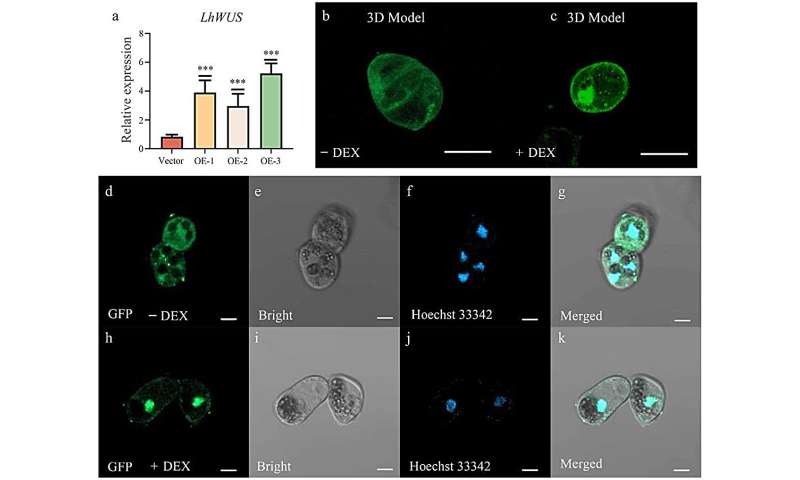Establishment of a glucocorticoid inducible system for regulating somatic embryogenesis in Liriodendron hybrids

Advancements in transgenic technology since 1983 have led to the widespread use of the 35S promoter, which lacks specificity and can be lethal. To overcome these limitations, research has shifted to inducible promoters such as the glucocorticoid-inducible system, allowing precise control of gene expression in plants.
However, the inducing agent dexamethasone (DEX) possesses a certain degree of toxicity, and DEX alone can induce expression of defense-related genes. Liriodendron hybrids exhibit valuable traits for ornamental and economic purposes. Thus, a stable and precise inducible expression system is necessary for artificially regulating the expression of key genes in a timed and quantitative manner.
On February 29, 2024, Forestry Research published a paper entitled "Establishment of a glucocorticoid inducible system for regulating somatic embryogenesis in Liriodendron hybrids."
The research develops a tailored dexamethasone/glucocorticoid receptor (DEX/GR) system for Liriodendron, with a focus on the WUSCHEL (WUS) gene, which is crucial for plant regeneration.
Initially, a p35S:LhWUS-GFP-GR vector was constructed and introduced into the embryogenic callus of the hybrid. After DEX treatment, the LhWUS-GFP-GR fusion protein efficiently translocated into the nucleus, while untreated controls remained in the cytoplasm. Furthermore, varying concentrations of DEX showed a dose-dependent rapid translocation of the fusion protein into the nucleus, with 1 mM DEX achieving peak fluorescence within 5 minutes.
The impact of DEX on callus proliferation and somatic embryogenesis was explored. Transgenic calli overexpressing LhWUS-GR exhibited increased expression of LhWUS and enhanced callus proliferation upon DEX treatment, particularly at a concentration of 1 μ , suggesting an optimal level for promoting growth.
Moreover, DEX-treated p35S:LhWUS-GR calli showed a higher number of somatic embryos than untreated controls, indicating a dose-effect role of DEX in somatic embryogenesis. Interestingly, regenerated plants from these somatic embryos could develop into full plants. Upon DEX treatment, the apical meristems showed noticeable enlargement, highlighting the effectiveness of the DEX/GR system in influencing plant growth.
This research establishes the DEX/GR system as a significant tool for genetic exploration in Liriodendron hybrids, effectively regulating gene expression and somatic embryogenesis, highlighting the potential role for functional genetics in Liriodendron hybrids and its applicability in other species. This system enables precise control over the expression of exogenous genes, facilitating detailed functional analyses and offering insights into the regulation of key developmental processes.
More information:
Xinying Chen et al, Establishment of a glucocorticoid inducible system for regulating somatic embryogenesis in Liriodendron hybrids, Forestry Research (2024). DOI: 10.48130/forres-0024-0003
Provided by TranSpread